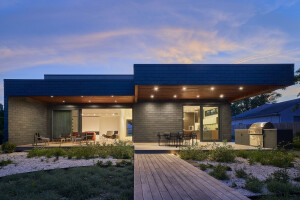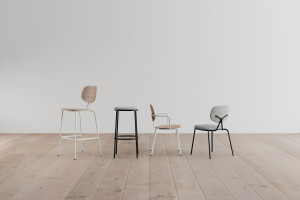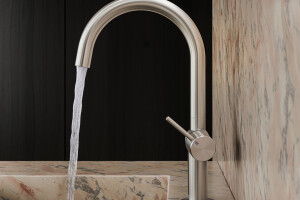There is a sense of quiet resistance in the apartment that Lucas Jimeno Dualde designed for a young couple in Sumarézinho, São Paulo. It's not the kind of space that insists on being noticed. Instead, it slowly draws you in.
The box-shaped entrance hall leads to a conversation already in progress, nothing here is overly precious. With an almost defiant fluidity — no doors between the living rooms, the kitchen and the playroom. It is a house that opens up giving access to private spaces, but never closed. Light streams in through the windows in a way that seems deliberate, casting the furniture in a soft glow.


You notice the balance first, how each piece of furniture seems to support its own weight, but never dominates the room. There is restraint in the palette — tones of stone, woods, warm colors. Dualde doesn't demand that you look; is not about looking for the design, instead, it invites you to feel, to notice the warm touch of wood on the floor, the mineral texture on the walls and ceiling, the encaustic tiles on the kitchen floor, the ceramic tiles on the countertop, the tiles in two sizes in the bathroom, the wood of the furniture designed especially for the house.


It's all about contrast, how the space exists between hard and soft, light and shadow, the way modern and vernacular happen without ever taking center stage. For the Spanish architect and designer based in São Paulo, the power of design is not in what you see, but in what you almost miss: the transitions between environments, the way a line or a curve can pull you forward. without you noticing.


In the first room, everything is oriented by the fireplace in flat lines that become a bench. Armchairs by Zanine Caldas and paintings by Lorenzatto. In the dining room there is a large table and chairs in freijó and straw, in the next room, a large living space, with a suspended sideboard made from wood, wicker and brass, a large fabric sofa suggesting that one takes long times on this space. Placed on the console, stones, vernacular sculpture, another painting by Lorenzatto offers a ceremonial stillness. The playroom is furnished to a child's scale and the curtain, embroidered by artisans from the northeast of the country, filters the light and illustrates the interior of Brazil during the June festivities.


The kitchen is more than a place to cook. From the antique-toned tile on the countertops to the straw cabinets that capture the light and somehow feel antique and modern. Everything here speaks in the language of careful craftsmanship, the meticulous carpentry of the dining table, the sofa designed for this very space, pieces that seem to always be waiting for this moment, this family. Small objects, a piece of Brennand pottery, a Japanese teapot, their stories and how they hold time.
In the hallway on the way to the bedrooms, the Curved Chair by Joaquim Tenreiro makes a statement. The room has everything it needs, the bed that accommodates it, the headboard, the side tables, the lamp and the armchair. A side sideboard and folding mirror take the place of the dressing table. The bathroom follows the same reasoning, the wood of the countertop and the light colors.


Outside, the view stretches all the way to the Cantareira mountains, a reminder that the city, in all its chaos, is just beyond the curtain. It was not an easy space to work in, the building itself without much charm, the layout presenting challenges that required respect for the existing structure. But that's where Dualde stands out, transforming limitations into poetry.
And in that simplicity, there is a kind of grace.


Team:
Architecture and interior design: Lucas Jimeno Dualde
Creation, development and executive project team: Augusto Kenji
Photographer: Fran Parente


Materials Used:
Materials: mineral texture / De Fragoso
Floor tauari wood
Encaustic tiles (kitchen and bathroom)
Bathroom and kitchen countertop: durasein resin.
Bathrooms: porcelanato danks white portobello, ceramic Casa antigua zellig.
Millwork freijó wood.
Furniture: Joaquim Tenreiro, Zanine Caldas, Borge Mogensen, Sergio Rodrigues, Lucas Jimeno Dualde.











































